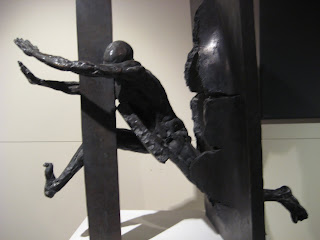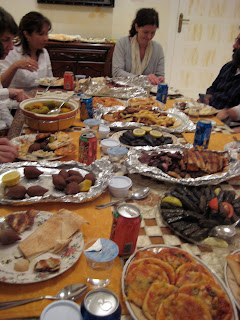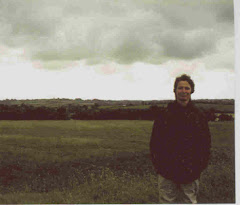Dusk in Araby
by Ruth Benander and Debra Beilke
----------------------------------
Authors' Note: This piece is intended as satire. No disrespect is intended towards the Fulbright-Hays Program, The American University of Kuwait, Kuwait City, the Dubai Police force, or the Ghani Palace. This piece of satire does not intend to minimize in any way the crime of human trafficking.
----------------------------------
The Ghani Palace Hotel crouched on the shores of the Arabian gulf, her faded glory gently decaying into the desert. Once she may have been considered lovely, but her charm had gone grey, and the process had not been graceful. In her later years, she received few guests into the warrens of her hallways, and when she did, it seemed to come as a great surprise. As her splendor waned, she became more of an architectural bookmark for beach front property rather than a page of text for some form of holiday nostalgia. Foot steps in her halls and many stairwells raised dust and sent the staff into a panic. But her bulky shadow could hide money as well as dust, and in the freewheeling blackmarket of the Gulf, this made her attractive.
Despite the mosque-studded skyline, the Kuwait City of the Ghani Palace, its own parallel universe, teemed with vice of all kinds—opium dens, beer-induced belching contests, and ladies’ saloons, to name some of the more rampant examples of sin in this den of iniquity. Yet lurking even deeper beneath the surface was something worse, far worse—an international ring of academic human trafficking known to insiders by the code name Fulbright-Hays. The latest crop of FH captives were trapped in a dhow that had been anchored close to the shoreline for weeks since they could not confirm their booking at the Ghani Palace.
Undercover agents from the Dubai police department were appalled at the human misery they discovered (via hidden video cameras rigged to the dhow’s interior.) The middle-aged captives were rolling in agony on the deck of the dhow as it rolled back and forth, back and forth, back and forth in the waves and the 120 degree heat. Already miserable from sea-sickness, the hapless academics were tortured even further by the techno-funky rap music pounding so loudly the reverberations were felt in Baghdad. Although the Dubai police (henceforth known as the “Dubai Boys”) felt the pain of the FH captives, they did not rescue them—not yet. They needed to watch and wait in order to uncover enough evidence to convict the king pin of this human trafficking. Daily, the Dubai Boys were learning more and more about this powerful Godfather. They knew he was headquartered in Washington, D.C. They knew his name was Joey. They knew his days were numbered.
It was noon in DC, seven in Kuwait, and Jerry was worried. The men holding the academics reported that yet another academic had requested to move to another location on the dhow, and several were complaining that the internet connection on the dhow was slow. Three had begun to clean the dhow, much to the dismay of their captors. This was not how humans being trafficked were supposed to behave. Worse yet, they were all taking notes and competing to interview their captors, each crafting clever questions to expose their captors' world views and cultural identities. Joey knew things were going from bad to worse when he discovered that the academics were blogging about their unique perspectives on the nature of human trafficking through ethnographic explorations and chronicling the disorienting dilemma of such participation. They drove their captors crazy by constantly trying to critically reflect on their experience. Joey knew he had to pawn them off soon on some university looking to contract faculty to teach English as a second language for low wages. How else could the knowledge economy be supported except through cheap academic labor to construct the foundations for the best educated populations in the world? It was dirty work, but someone had to do it. Joey just saw himself as another epistemological middleman. He contacted his man, Jamal, in Kuwait.
Jamal sat on the roof of the Ghani Palace watching the sun set over the broiling city, throwing cigarette butts into the roof-top pool. He fondled his prayer beads as he reflected on the Fulbright Hays dilemma. Clearly, something had to change; the dhow was no longer a safe place to keep his captives. But where to transfer them? As the hot desert winds began to whip themselves into a frenzied sand storm, Jamal had a brainstorm. Why not move his human cargo to the Ghani Palace? Nobody would ever think to check for them in the Palace. It never occurred to anybody to check into the Palace. It was the perfect solution. There were a few minor problems--such as the need to train his operatives how to put towels in the hotel rooms, how to clean the sinks, how not to look confused when a hotel guest tried to check in—but these could be easily resolved.
Two hours later, Jamal was riding the waves of the Arabian Gulf on his jet ski as he raced towards the dhow at full speed. He was followed by a twelve-pack of Filipina operatives in matching outfits on their own jet skis. He was feeling good, full of resolve. He and his operatives would climb on board stealthily and grab the captives from behind. Before they transferred them to the jet skis, the Filipinas would, of course, offer them coffee and a selection of chocolates. Working in the underbelly of academic trafficking is no excuse to behave like barbarians, after all, and protocol had to be observed.
Suddenly, in the dark and stormy dusk, a door slammed, a maid screamed, a pirate ship appeared on the horizon. The maids scattered in confusion, their jet skis making a maze of wakes that shook the dhow like a flag in the stiff breeze. Jamal leapt from his jet ski to the dhow, desperately clambering up the ladder, slick with the two-stroke engine sheen left by the hordes of jet skis. He was unprepared for the sight that met his eyes. The dhow had been transformed into faculty offices. Surrounded by reference texts, maps, and jumbles of flash drives, the academics looked up.
"Do you have any cold water?" one asked distractedly, "It's rather hot. How can I be expected to complete my curriculum project if there isn't a cold bottle of water to drip all over my notes?"
“I’d rather have a beer,” muttered one under his breath. “When I was trafficked in Ghana, at least they had plenty of good beer.”
From a heap of books and papers, another academic peered at Jamal and asked, "Where are your parents from? Do you have national rights? Did you go to university in the United States? How do you feel about the efficacy of the parliamentary system in a country where family clan loyalty is still an entrenched decision making protocol? "
A third academic marched briskly up to him and said, "Your maps are out of date. You only have maps from the 1940s. Have you noticed that things have changed? You can't still list pearl diving sites in maps of the 21st century because that is merely a rhetorical invocation of the past. There is no place for rhetoric on maps." She glared at a stunned Jamal.
Yet another captive, who lay groaning with sea-sickness, mewed feebly from across the dhow, “Do you know of ANY Kuwaiti authors? Any at all? There must be at least one Kuwaiti Jane Austen wannabe…”
A distinguished academic in the back shouted, "This hummus is terrible! Give me a proper kitchen and I'll make you hummus that will knock your eyes out."
Jamal sat down. Who were these people? He was promised young pretty girls with pert American accents. It was supposed to be easy: take their passports, promise them authentic exotic experiences, and hand them over to the American University. This crop of contract workers did not look at all like pretty young girls and taking their passports appeared to be as easy as finding edible food at the breakfast buffet of the Ghani Palace. "I have to think," Jamal said, voicing his confusion aloud. The result was immediate. All the academics retreated to their piles of notes and left him alone. Someone had to think: they understood that.
Jamal looked disconsolately, and then with growing hope, at the approaching pirate ship which appeared to have Dubai Police stenciled on the side. Yes, he was correct: it WAS the Dubai Police, those high-tech superheroes of justice who were so effective at stomping out crime in their own emirate that they had been recruited to clean up in Kuwait as well. Jamal knew that the Dubai surveillance apparatus was second to none. He knew, too, that their gig was up. They were busted. What to do? He made his decision: he would give himself up to the Dubai boys and tell them all he knew about Jerry. He hoped they would be lenient on him. After all, he was just a low-paid contract worker himself. Why should he go down for the Godfather’s wrongdoings? If he were lucky, he might get off with 100 lashes and deportation to Egypt.
He stood up on the front deck of the dhow and waved a white flag at the Dubai Boys. From the bow he had a better view of the approaching ship. The Dubai Boys had spared no expense. The finest calligraphers in the world had stenciled the gleaming white cutter, the whitest in the world. The cabin towered above the deck and was the tallest cruiser cabin in the world. And what was that tall white structure in the back? It looked like a ski slope….it WAS a ski slope—the tallest manmade pirate ship ski slope in the world. Those Dubai boys knew how to travel in style. Unfortunately, the entire boat was not occupied, as several cabins remained empty since the construction of the boat. The interior was not quite finished, but none of that mattered: from the deck of the dhow, they looked good. The best in the world.
As the Dubai Boys pulled alongside the dhow, Jamal had second thoughts. He figured it might be better just to lie low. His English was good, he was wearing cargo shorts, and if he could just get his hands on bulky man-bag, he might be able to pass for a professor. Quickly, he huddled behind a nearby stack of papers and tried to look interested in minutia.
The police were getting busy. It took some time to rescue the academics. As soon as the Dubai Boys thought they had them all in one place, two or three would wander off. One kept requesting coffee. Another briskly informed the police that it was time to pee, and half the group disappeared into the bathroom. In a desperate attempt to get the academics off the dhow, an officer announced that there would be coffee and snacks served on the other boat. The effect was electric; most of the academic, now plus Jamal, were on the police cruiser so fast the dhow hardly rocked, but on the way over two of the academics got distracted and leapt overboard. Fearing some kind of bizarre escape from rescue, the Dubai Boys looked over the railing. There were two middle aged ladies paddling around next to the boat.
“Look at us swimming!” they called, “Does any one have a camera to document us swimming in the Gulf!”
The Dubai Boys pulled them out and firmly locked them in the cabin to drip all over the sofas and not create more distractions while Jamal clutched his makeshift man-bag to his chest and hoped he would not be noticed. The Dubai Boys did not have time for details like counting human trafficking victims. Since there was no human trafficking in Dubai, they actually had little experience with the crime. Only 23 cases were recorded each year in Dubai! As a result, they figured they would just liberate the academics in Kuwait City and let them figure out the details. Jamal had no cause to worry. Maybe, he thought, this was his ticket out of the Ghani Palace and on to better things. He planned his new future during the trip back to shore.
On shore, a new crisis presented itself: where to put the academics? The Dubai Police were not interested in some measly victims of human trafficking. Who could believe them anyway: they probably came to work as contract educators for the universities on their own, planned a dhow trip, and got stuck out there. And lost their passports. And had unrealistic expectations about their work situation. They probably brought it on themselves. The Dubai Police were more interested in the mysterious Joey. The academics could tell them nothing except that he had booked them rooms at the Ghani Palace Hotel. If the Dubai Police couldn’t get a lead on Joey, they at least discovered a block of rooms reserved and paid for at the Ghani Palace. But there were only rooms for ten and there appeared to be eleven in the group. Jamal tried to make himself look smaller and more erudite.
“Make the guys room mates,” barked the Dubai Police sergeant in a sudden fit of inspiration, and the confused desk clerk tried to figure out how he would give the guys rebates, as the sergeant requested. The desk clerk was better at intimidating young women than booking guests into a hotel. These were two completely different skill sets. He knew guests needed keys, so he just started handing out keys. It worked: they all went away. The academics, the police, the guys from the pool hall down stairs who had come to watch the show: they all went away. A dusty calm resettled on the reception area of the hotel. The desk clerk went out to give tuna to the stray cats, so he did not hear the phone begin to ring as the new guests he had given room keys to discovered that they were living in a building whose maintenance had been neglected and this neglect needed to be instantly reported, noted, addressed, and critiqued.
Jamal went back up to the rooftop pool to smoke. He was back where he had started, but he felt changed. He had narrowly escaped, and it seemed that Joey was incommunicado. What to do? He had rather liked the eccentric tribe of the professoriate. They were geeky but fun. He liked his man-bag. It was so much easier than carrying everything in his pockets, and there was room for water and a hat. He contemplatively flicked another cigarette butt into the pool and wondered if he were too old for graduate school.




























































